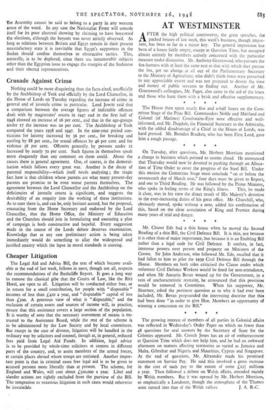Crusade Against Crime
Nothing could be more disquieting than the facts cited, unofficially by the Archbishop of York and officially by the Lord Chancellor, in the House of Lords on Tuesday regarding the increase of crime in general and of juvenile crime in particular. Lord Jowitt said that a comparison between the average figures of indictable offences dealt with by magistrates' courts in 1947 and in the first half of 1948 showed an increase of i6 per cent., and that in the age-groups under 17 the increase was 20 per cent. The Archbishop of York compared the years 1938 and 1947. In the nine-year period con- victions for larceny increased by 36 per cent., for breaking and stealing by 88 per cent., for sexual offences by 46 per cent, and for violence 58 per cent. Offences generally, by persons under 21 increased by nearly 70 per cent. Such figures in themselves speak more eloquently than any comment on them could. About the causes there is general agreement. One, of course, is the demoral- isation which follows every great war. Another is the decay of parental responsibility—which itself needs analysing ; the tragic fact here is that children whose parents are what many present-day parents are promise to be even worse parents themselves. The agreement between the Lord Chancellor and the Archbishop on the deficiencies of juvenile courts is significant, and suggests the desirability of an enquiry into the working of these institutions. As to cure there is, and can be, only hesitant accord, but the proposal, emanating from the Home Secretary and endorsed by the Lord Chancellor, that the Home Office, the Ministry of Education and the Churches should join in formulating and executing a plan of campaign is both constructive and hopeful. Every suggestion made in the course of the Lords debate deserves examination. Knowledge that at any rate preliminary action is being taken immediately would do something to allay the widespread and justified anxiety which the lapse in moral standards is causing.




































 Previous page
Previous page